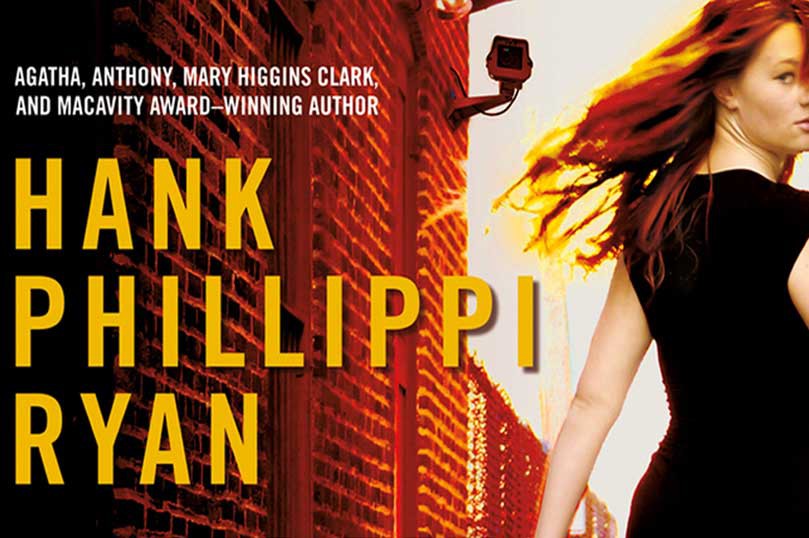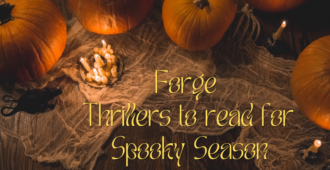opens in a new window opens in a new windowWhat You See, the fourth installment in Hank Phillippi Ryan’s award-winning Jane Ryland mystery series, follows Jane as she searches for a flower girl abducted by her own stepfather at a family wedding.
opens in a new windowWhat You See, the fourth installment in Hank Phillippi Ryan’s award-winning Jane Ryland mystery series, follows Jane as she searches for a flower girl abducted by her own stepfather at a family wedding.
Meanwhile, Detective Jake Brogan investigates a public murder in Boston, and discovers that while the case should be easy to solve, the photographic evidence leads to not only a dark conspiracy of extortion, but a trail of lost lives.
Faced with difficult choices, Jane and Jake must navigate their loyalties to one another, their families, and their careers — if they make the wrong decision, the consequences could be fatal. Please enjoy this excerpt.
Chapter One
“Somebody saw something. And most of them took pictures of it.” Detective Jake Brogan watched the uniforms try to corral the chaos of tourists and brown-bag-toting Bostonians while two crime scene units unspooled parallel rolls of their yellow plastic tape. Sirens wailed, three EMTs leaped from a red-and-white ambulance, the beeping Walk signal ordered clustering pedestrians to cross Congress Street, and angry drivers honked disapproval as police cadets in orange bandoliers signaled all cars to stop.
Jake had heard screams through the plate-glass window of the Bell in Hand, abandoned his carry-out roast beef sub on the restaurant counter, ran half a block. Found this. Radioed his partner. Lunch hour, now put on hold by murder.
“Wall-to-wall spectators, the good news and the bad news.” Paul DeLuca shaded his eyes with one hand. The two detectives had split up to grab lunch, D opting for the corner Dunkin’s, DeLuca still held his iced coffee, third of the day. “Who called nine-one-one? Anybody run away?”
“That’s what we’re about to find out,” Jake said. “Most cases, nobody saw anything. Here’s the opposite. Too many witnesses. That’s a new one.”
In the center of the circular redbrick plaza, in the noontime shadow of the burnished bronze knee of the Mayor Curley statue, some poor soul in a once-white shirt lay face down, his running shoes splayed, a navy blue Sox cap teetering on the concrete, the hilt of a knife protruding absurdly between his shoulder blades. Jake had immediately radioed the medical examiner, who was now only minutes away. They’d need to dispatch the cleanup team, too. With the Fourth of July a month from now, the mayor would go ballistic over the growing puddle of red staining this concrete pathway along the visitor-magnet Freedom Trail. So much for the beginning of tourist season.
Across the street, in the teeming marketplace behind Faneuil Hall, persistent vendors offered Sam Adams tricorns, BOSTON STRONG T-shirts, and plastic lobster souvenirs. Visitors unlucky enough to witness this noontime stabbing had already received a souvenir they’d likely want to forget. But not until Jake picked their brains. And cell phone histories.
“I want names. I want addresses,” he told DeLuca. “I want their phones and I want their cameras.”
From moment one, Jake knew this would be a mess. Some of these people would lie, some would make stuff up, some would see things that never existed, some would have something to hide. Some would run. Complicating it all, he and DeLuca technically needed individual warrants to seize property. If any onlooker knew the law and gave them grief about it, it’d be even more of a shit show.
He pointed his partner toward the cadets. “The supe sent the new kids to ‘help.’ All we need. Tell them not to let any witness leave without giving contact information.”
“Where’re we gonna put ’em all, though?” DeLuca sucked a hit of coffee through a clear straw. “The Garden? Maybe they can watch Disney On Ice while we get their deets.”
DeLuca had a point. Even the bleachers of the nearby Boston Garden sports arena were no solution. How could Jake keep fifty or so witnesses, from little kids to one guy in a wheelchair, in semi-custody while a group of cadets practiced collecting personal information and asking for photos?
“If we’d gone to Santarpio’s like I wanted, we’d be all the way in Eastie,” Jake said. “Dispatch might have sent someone else to handle this mess.”
“There is no someone else,” DeLuca pointed out. “Vacation time, budget cuts, short staffing. We get the short straw.”
“We get all the straws,” Jake said.
A lanky blue-uniformed EMT wearing lavender latex gloves, black running shoes, and a pencil stabbed through her graying ponytail trotted up to the two of them. She gestured toward the two medics kneeling over the victim.
“Not a whole lot to tell, Detectives. White male, approximately forty-five years old, deceased. Stab wound to the back. Just the one. Happened, I’d say, pretty much instantly,” she said. “We got here at twelve-oh-four. Called it at twelve-oh-five. Knife’s still in, wouldn’t have mattered. Thought the ME should see it as is. We’ll let her look for ID.”
“She’s on the way. Thanks, Doc,” Jake said. EMT Deborah Kratky wasn’t actually a doctor, but she’d been on the job long enough to know as much as any medic. She’d even been there to see a rookie Jake handle his first homicide. It was up in the Blue Hills, a disturbingly arranged female corpse, turned out the victim of a Boston Strangler copycat. Ten years later, Jake no longer felt like throwing up at crime scenes. Not necessarily a good thing. Cops get bored, cops make mistakes. Jake never wanted to get used to murder.
“Anybody know anything?” he asked. “See anything? Say anything?”
“Not to me.” Doc looked back at the crime scene, hands on hips, one eyebrow raised. “Crap. Would you stand there? With your little kid? Rubbernecking a dead person? Blood on the sidewalk? I sure wouldn’t, if it wasn’t my job.”
A dusty yellow city bus, emblazoned GO BSO, wheezed up to the stop across from the bank. One of the cadets waved both arms at the driver, signaling him to move on. Faces peered from each square window, a puff of exhaust pluming to the curb as the bus pulled away.
“Whoever did it’s gotta be big, lot of muscle. One blow like that?” Jake scanned the crowd for anyone who fit the bill. Would the killer be dumb or strange or crazy enough to hang around? Cadets were taking names, writing on clipboards. Couple of people tried to leave, didn’t succeed. Most were texting, calling, taking photos. Better not be erasing anything. Evidence these days was ephemeral. One click of a button, it got zapped into nothing.
“Big? Maybe. Or maybe angry. Or full of adrenaline. Or drugged up. And spattered with blood,” Doc Kratky said. “Maybe. Unless he—or she—has already dropped their clothing somewhere.”
“In which case we’re screwed,” D said.
“One step at a time,” Jake said. “Look at all those phones. Each one’s got a possible photo.”
Might as well try to stay positive. Maybe the days of relying on tiny specks of evidence in glassine bags, untrustworthy eyewitnesses, and fabricated alibis would fade into law enforcement history, as antiquated as a posse on horseback, wiped out by night-scope lenses and twenty-four-hour videos and satellite pings. They’d nailed the Marathon bombers using video from department store surveillance. All they needed to catch this bad guy was someone who’d clicked a cell phone camera at exactly the right time.
“Makes you understand how movie stars feel, right? Paparazzi?” Doc said. “Guess that’s good for you guys, though. Reporters will be here soon, no doubt, trolling for tourist cam photos.”
Ordinarily, Jake would be wondering whether “reporters” might mean Jane. This time he knew it wouldn’t.
“What you see is what you get,” DeLuca said. “Cameras don’t lie.”
“Witnesses do,” Jake said.
Still, whatever was caught on camera could be their ace in the hole. Some of the bars that lined one side of Congress Street, not to mention the monolith City Hall itself on the other side, must have security systems. Those videos they could instantly seize.
“So we won’t transport till the ME—” Jake heard two quick beeps of a horn, Kat’s signal she was arriving. Jake knew she hated the siren. No rush for me to get there, she always said. No need to announce another death. “Speak of the devil.”
The gawkers turned, each camera and cell phone now pointed toward North Street and the blocky white van, stenciled in black letters MEDICAL EXAMINER. The right-side wheels jumped the curb onto the sidewalk. The driver’s-side door clanged open, slammed closed. Jane always referred to Dr. Katharine McMahon as one of those Russian dolls in a doll, all dark hair and red lips and curves. Jane and Kat had taken a month or so to reach feminine détente, but they were okay now. Under her white medical jacket, Jake saw that Kat’s hot pink T-shirt said LOVE IT LOCAL.
“See that?” DeLuca whispered. “You bet I will.”
“Have some respect,” Jake said.
“Why start now?” DeLuca said.
***
“So why’d you leave the Register?”
The very question, word for word, that Jane Ryland feared most. And the very question, word for word, that Jane had no idea how to answer.
Channel 2’s news director, Marshall Tyson, all smiles and pinstripes, office strategically landscaped with award statues and celebrity photos and one duPont gold baton, had sprung it on her, but only after an excruciating half hour of niceties and journalism chitchat, followed by a play-by-play commentary on the A-block of the noon Eyewitness News, the broadcast still under way from the newsroom anchor desk outside his corner office.
“Well, it’s complicated,” Jane began.
Complicated wasn’t even the word. It was a mess, from moment one, a mess.
Jane had walked the gauntlet of speculation, escorted by a chatty assignment desk intern, weaving through the newsroom’s warren of cluttered desks and flickering computer monitors toward Tyson’s office. Jane would be recognized, of course, from back when she was an on-air competitor. In the news business, which “talent” was “crossing the street” to a rival station was the most delicious topic of gossip, even better than who got fired for stealing promotional swag from the mail room, which reporters were getting sued, and why the noon anchor kept so many extra clothes in her office. No outsiders knew the scoop on what happened to Jane at the Boston Register last month. And how could she explain it?
In the midst of triumphant headlines at the Register, her investigation had uncovered a problem close to home. Jane proved a longtime reporter there had been fabricating stories. For years. Bad enough, but the clincher was worse. The newspaper decided to cover it up. Ignore it.
For Jane, that left only two choices.
She could be complicit. Or she could quit.
If she ratted out the paper for using fabricated stories, she’d argued, didn’t it also put articles by all the reporters in question? If the public suspected some were partly fiction, would readers ever believe anything?
So here she was, once again a victim of her own damn ethics. Here she was, at the TV station that used to be her biggest competitor, discussing her third reporting job in five years. Not the most reliable-sounding résumé for a thirty-four-year-old, even in the nomadic climb-the-ladder world of journalism.
The intercom buzzed, and Tyson’s cell phone pinged with a text.
“Sorry, Jane.” The news director tapped on his keyboard with one hand, used the other to grab his phone, tucking it under his chin. “Gotta take this.”
At least this time she wasn’t a supplicant. Marshall Tyson had called her, using a “heard you’re no longer with the paper” opening ploy in his voice mail, followed by “come chat if you’re interested in getting back on the air, if you’re not too busy.”
Busy? Jane had rolled her eyes as she listened to his message. Oh, she was busy. Busy being unemployed again. Busy facing her younger sister’s wedding this coming weekend. Busy entertaining bride-to-be Lissa, arriving in Boston this afternoon. Busy prepping to meet her sister’s fiancé, “Dan the man of mystery,” Jane privately called him, who’d arrive whenever Daniel Fasullo’s corporate jet landed from whatever exotic overseas location. Busy preparing for a trip home to the Chicago suburbs to play maid of honor.
The good news: Jake had promised to come with her to Chicago. This weekend.
Now that she was unemployed, and therefore no longer encumbered by the reporter/source prohibition against dating, she and Jake had been experimenting with going public with their … whatever it was. Relationship. Still being careful. But not always hiding.
Tyson was still deep in his phone conversation, looking out into the newsroom as he spoke. Jane followed his gaze, saw three young women at the assignment desk with two phones each plastered to their ears. Something was going on.
“When?” Tyson glanced at her, rolling his eyes in apology. She waved him off. She understood news came first. Anyway, it gave her time to think.
If Channel 2 offered her a job, did she want to go back to TV? Her bank account could certainly use the paycheck. And if the good guys quit, who’d be left? Maybe she could make a deal with Tyson to do only in-depth stories, groundbreaking investigative stuff.
Yes or no? Saying yes would mean she and Jake would have to return to the shadows. Right now, in this news director’s office, she had to decide: Love or money? Seemed like she was doomed not to have both.
But wait.
She could simply say maybe. Consider it, talk to Jake. If Channel 2 wanted her, they would wait. She mentally acknowledged her own wisdom, patted herself on the emotional back. She had control of her life. She needed to remember that.
Tyson raised a palm to her, pantomiming sorry, one moment, as he stood. His door opened. The newcomer, horn-rims and oxford shirt, clipboard, looked at Jane, assessing.
“Sorry to interrupt, Marsh, but—”
“We got anyone who can go over there?” the news director asked. He’d hung up the phone without saying good-bye. “Jane, this is Derek Estabrooks, our assignment guy. Derek? Anyone?”
“Negative, that’s the thing. Hey, Jane.” He acknowledged her with a quick up and down. “We got the morning crews doing outta-town live shots for the noon, and the next shift is the two thirty people, so we’re kinda screw—”
“You ever do freelance, Jane?” The news director, interrupting, pointed a forefinger at her. “We’ve got a big story we can send you on. Right now. You up for it? But we gotta have an answer. Right now. Yes or no?”
Copyright © 2015 by Hank Phillippi Ryan
What You See goes on sale October 20th. Pre-order it today: opens in a new windowAmazon | opens in a new windowBarnes & Noble | opens in a new windowBooks-a-Million | opens in a new windowiBooks | opens in a new windowIndiebound | opens in a new windowPowell’s Books | opens in a new windowWalmart






